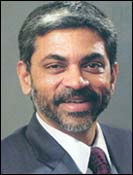 If the stereotypical university professor is an egghead with his nose buried in dusty, theoretical tomes, Narayan Pant is the exception.
If the stereotypical university professor is an egghead with his nose buried in dusty, theoretical tomes, Narayan Pant is the exception.
The associate dean of executive education at INSEAD's Asian campus declares he would far rather spend time learning what makes people tick. No surprise then, that the professor begins the meeting by tossing questions at you.
The childlike curiosity probably comes from a peripatetic lifestyle. Having left India at six, Pant lived in Switzerland, parts of Africa, the United States and Canada, before he finally settled on Singapore, where he lives now with his wife and two sons.
At INSEAD's Singapore campus, Pant closely follows Asian businesses, a topic he teaches in the classroom. Mention Indian companies going global and the 40-something professor sits up.
"What is fascinating for me is that the moment we come up with an idea that Indian companies should follow to become global, we see it is already being carried out in some pockets globally."
Hence Indian companies could easily learn at the expense or experience of others who have honed specific industries to create their identity on the global map, such as Japan's expertise in consumer electronics and automobiles.
Indian companies should watch out for two issues, declares Pant.
One, they must stop thinking that the presence in the home country is enough: many companies that want to go global think that since they are located in India and invested a lot in people and talent, the competitive advantage is in India.
"That is okay in the initial stages of development. But eventually you have to compete on the same field with global competitors. So, you may have to compete at the high-end of the value chain," he explains. "To serve the high end of the value chain it will be necessary to locate out of India," he says.
Pant proceeds to debunk a second myth, a favourite with Indian companies.
"Companies should break out of the belief that they have enough talent at the superior level. If companies really want to go global, they should acclimatise themselves to the global mindset and ensure they have talent that can compete in the international market," he says.
His example: Japan marked its place on the global business scene only after it began hiring a reasonable number of foreign talent. In contrast, Chinese companies face a dearth of superior managerial talent at the top.
So, does that mean Indian companies aren't ready to go global? Not so. "With an increasing number of Indian companies acquiring foreign companies, you see the beginning of global Indian entities," Pant says. One trend he finds interesting is industry branding.
"Indian companies may not have invested much in developing individual global brands, but as industries they are doing so remarkably well that they've eclipsed some of the manufacturing performers."
There's a third misconception Pant is keen to expose, that income statements are always indicative of the spends people are actually willing to make. Simply because different people spend different percentages of their incomes on finance. Pant sees great potential at the bottom of the pyramid.
"Currently, you see healthcare or even home finance innovations in developing countries catering to the upper income or the middle income categories. But even the poor can pay," he exclaims. "The developing world actually has the opportunity to take the leadership position in creating solutions addressing the bottom of the pyramid," he says.
But if profits are not necessarily encouraging at the bottom of the pyramid, how do you handle that? "Cost structures are different at the bottom of the pyramid. So companies need to inculcate a different mindset to address it," he suggests.
That's familiar territory for Pant. In the late-1990s, he took a break from academics to work as a consultant with Monitor Group, Michael Porter's American consulting firm. Later he started his own firm, Clean Slate Consulting.
"It's important for academicians who cross over to consulting, to get out of the supply-side thinking to a demand-side thinking mode. You have to think of creating value for the client and think of results," he says. "It's all about how well you can change the mindset." We agree.





